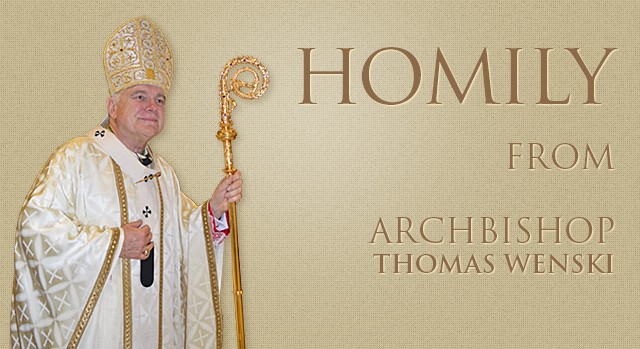By Archbishop Thomas Wenski - The Archdiocese of Miami
Archbishop Thomas Wenski preached this homily Dec. 30, 2018, at St. Augustine Church in Coral Gables.
Today, the Sunday after Christmas, we celebrate the feast of the Holy Family. Our celebration today at St. Augustine is somewhat muted � as this parish this week lost its father and pastor, Msgr. Tomás Marín. We are saddened by his death � and we will commend his soul to the Lord confident that our Merciful God will receive his soul and give him the reward promised to those who served him faithfully in this life. Friday, he will be waked here at St. Augustine and on Saturday, the Mass of Christian burial will be celebrated at Our Lady of Guadalupe where he, as the parish’s founding pastor, served for 9 years.
May God grant him eternal rest.
When the shepherds went to the stable of Bethlehem after hearing the angels’ announcement of glad tidings, they found Mary and Joseph and the baby in the manger. This scene is represented in “cr�ches” in our homes and in our churches � and the scene invites us to contemplate and to meditate on what we see and the Mystery it reveals.
We see, then, that the first witnesses of Christ found themselves not only before the Infant Jesus but also before a small family � a mother, a father and the child.
When God chose to reveal himself, he did so within a family � and, in a real way, the family is an icon of God. God is love � and the love of a husband and wife who are created in his own image and likeness reflects this love of the Most Holy Trinity in their coming together as one.
The feast of the Holy Family reminds us of the sacredness of the institution of the family itself. For the flourishing of human society, the family is not optional. John Paul II insisted, as did the Church Fathers at the Second Vatican Council, the good of persons and of society is affected by the healthy state of the family. In other words, healthy families mean healthy people and healthy societies. It should be obvious that much of the dysfunction that occurs in people’s lives, or in the life of society, has its roots in dysfunctions found in the breakup of the family today.
As I said, for the flourishing of human society, the family is not optional � even for God. When God chose to reveal himself, he did so within a family. He didn’t need Joseph to make Jesus � for the Word became flesh in the Virgin Mary’s womb by the power of the Holy Spirit and not through any human agency. But God judged it necessary that Jesus be raised by Joseph who was married to his mother, Mary.
The family then � founded on the marriage of a man and a woman � is the path where children best can encounter and know God; it is a school of faith and of values; it is where the mutual self-giving and faithfulness of husband and wife provides a secure and protected home for children to best grow in virtue and to assume their own responsibilities as members of society and as citizens of a country.
Often, when I was a parish priest I would ask the men of the parish: what was the best way to show their children that they love them. I would get many answers. Some would say � to provide for them; others would insist � to educate them; some would say � give them good example or advice. All this, of course, is true. But I would tell them that the best way to love their children was simply to love their children’s mother. And this love is best expressed in a permanent, faithful and fruitful relationship called marriage.
For this reason, the Church invites all families to look to the Holy Family of Nazareth as a model � for all parents and all children should strive to imitate the virtues found in that family; but also the Church invites all families to find in the Holy Family comfort and strength. Mary is a mother for us all � but she can be in a special way a mother to the motherless; and Joseph, the foster father of Jesus, can also be a protector and guide to those who are fatherless.
Certainly the Holy Family knew hardship. They were homeless � for Christ was born in a stable; they were stateless refugees � for Joseph had to flee with Mary and baby into Egypt (and you can be sure that Joseph didn’t wait to cross the border legally). Like all families, the Holy Family shared both joys and sorrows. During this holy Christmas season, I pray that your families also share in that love that was always present in that Holy Family of Nazareth.

